(新课标)Module1 Unit1 Let's try to speak English as much as possible.课件
文档属性
| 名称 | (新课标)Module1 Unit1 Let's try to speak English as much as possible.课件 |  | |
| 格式 | pptx | ||
| 文件大小 | 9.3MB | ||
| 资源类型 | 试卷 | ||
| 版本资源 | 外研版 | ||
| 科目 | 英语 | ||
| 更新时间 | 2022-08-27 17:50:53 | ||
图片预览

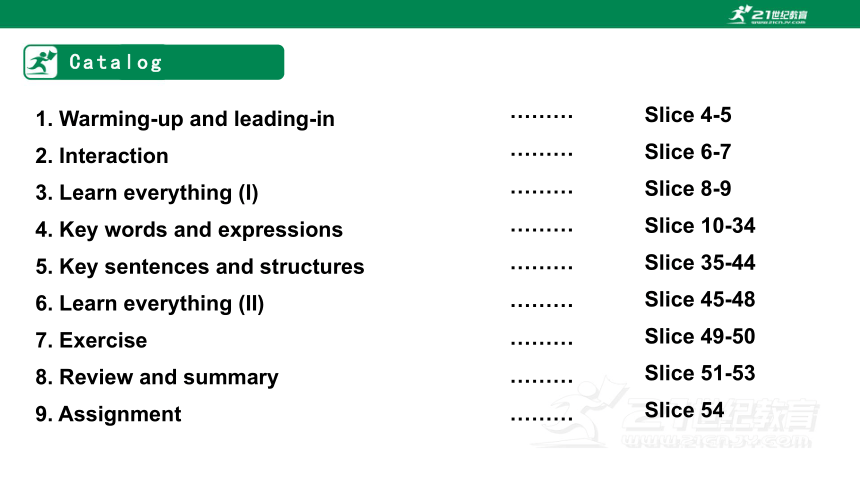
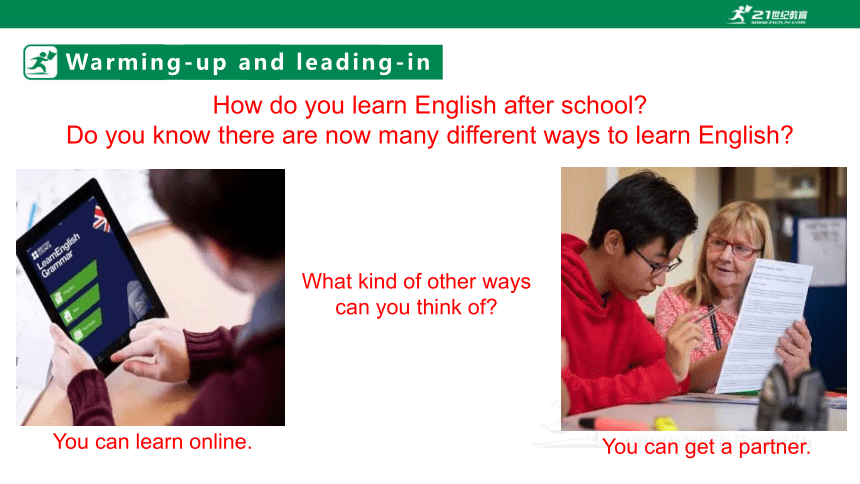
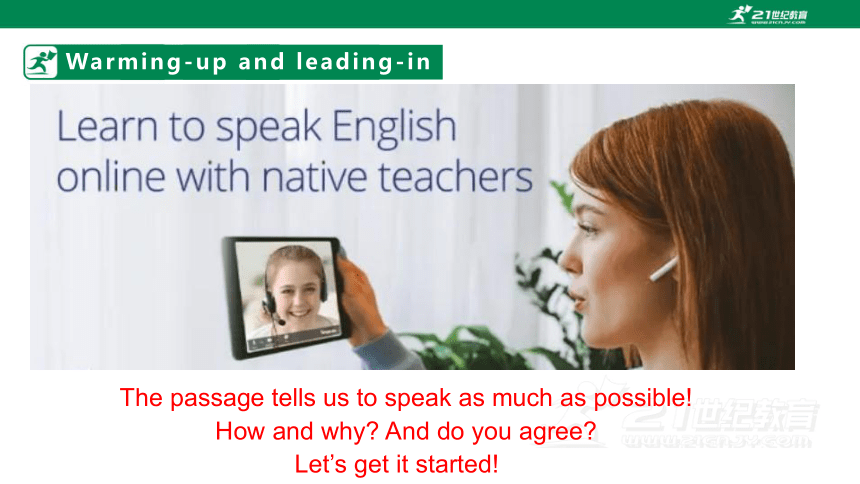
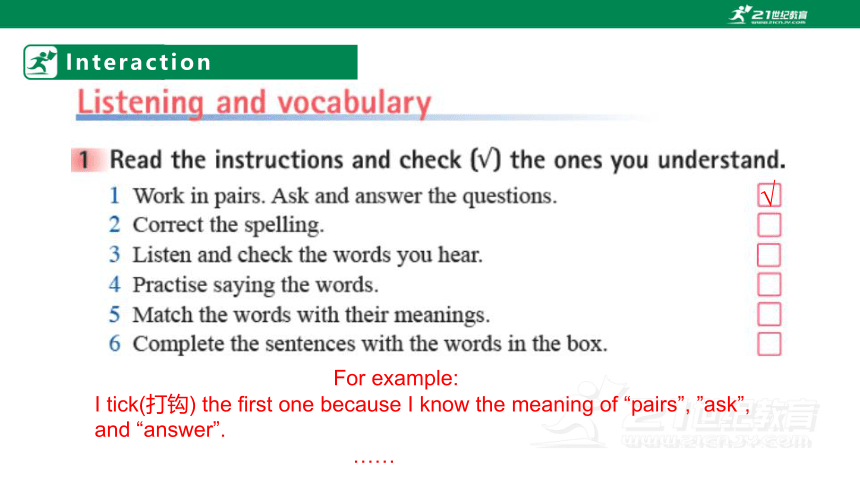
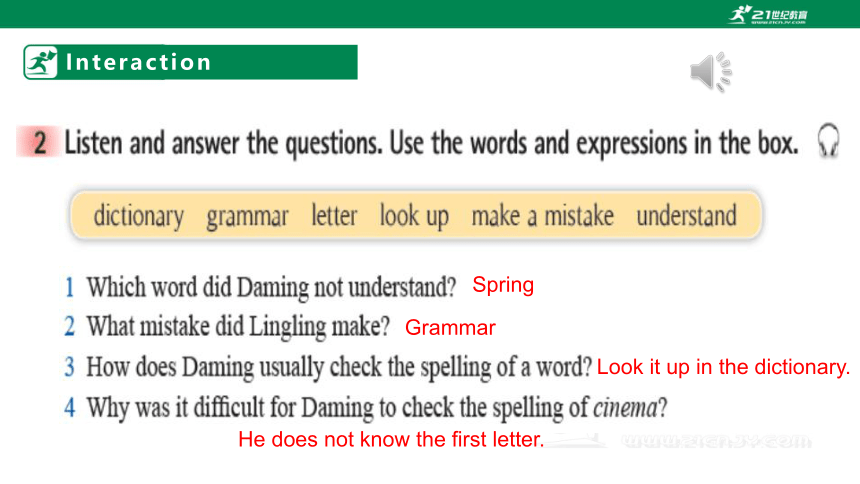
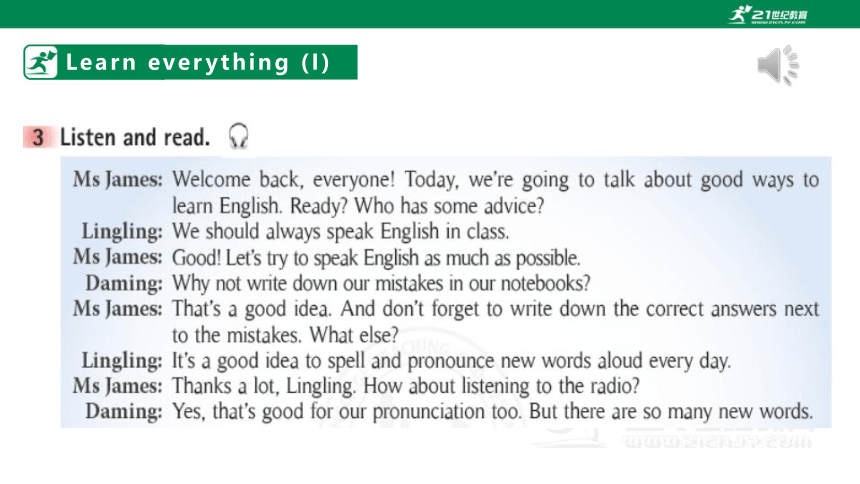

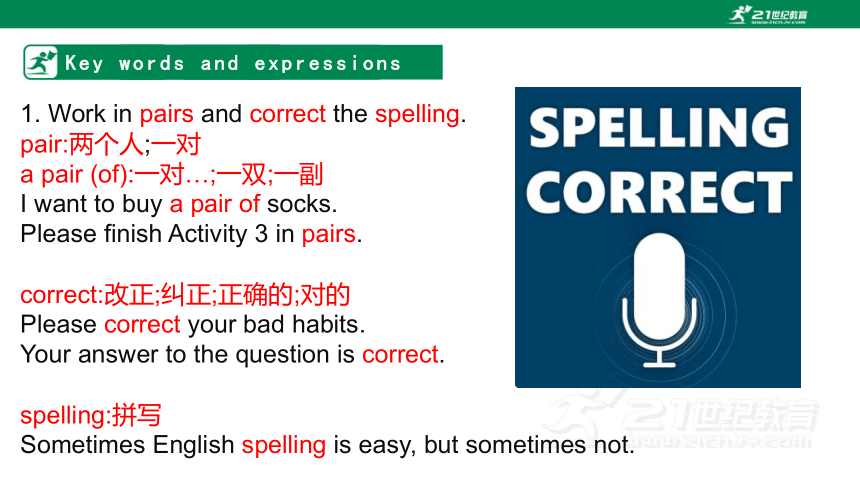

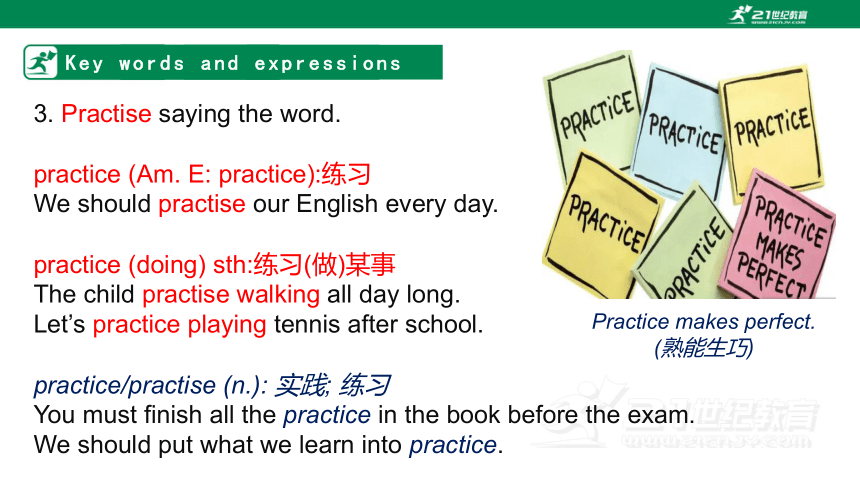

文档简介
(共55张PPT)
Module 1 How to learn English
外研版八年级上册
Unit 1
Let’s try to speak English as much
as possible.
Catalog
1. Warming-up and leading-in
2. Interaction
3. Learn everything (I)
4. Key words and expressions
5. Key sentences and structures
Slice 4-5
Slice 6-7
Slice 8-9
Slice 10-34
Slice 35-44
………
………
………
………
………
7. Exercise
8. Review and summary
9. Assignment
Slice 49-50
Slice 51-53
Slice 54
………
………
………
6. Learn everything (II)
Slice 45-48
………
Learning objectives
Warming-up and leading-in
How do you learn English after school
Do you know there are now many different ways to learn English
You can learn online.
You can get a partner.
What kind of other ways
can you think of
Learning objectives
Warming-up and leading-in
The passage tells us to speak as much as possible!
How and why And do you agree
Let’s get it started!
Interaction
For example:
I tick(打钩) the first one because I know the meaning of “pairs”, ”ask”, and “answer”.
……
√
Interaction
Look it up in the dictionary.
Spring
Grammar
He does not know the first letter.
Learn everything (I)
Learn everything (I)
Learning objectives
Key words and expressions
1. Work in pairs and correct the spelling.
pair:两个人;一对
a pair (of):一对…;一双;一副
I want to buy a pair of socks.
Please finish Activity 3 in pairs.
correct:改正;纠正;正确的;对的
Please correct your bad habits.
Your answer to the question is correct.
spelling:拼写
Sometimes English spelling is easy, but sometimes not.
Learning objectives
Key words and expressions
2. Listen and check the words you hear.
word:词;单词;字
Which word is easy and which one is difficult
Tell me how to learn English in your words.
have a word (with…):(和…)谈话
May I have a word with you before the meeting
I don’t want to have a word with the teacher
because she is so strict.
have words (with…):(和…)吵架
We had words earlier that day.
Learning objectives
Key words and expressions
3. Practise saying the word.
practice (Am. E: practice):练习
We should practise our English every day.
practice (doing) sth:练习(做)某事
The child practise walking all day long.
Let’s practice playing tennis after school.
practice/practise (n.): 实践; 练习
You must finish all the practice in the book before the exam.
We should put what we learn into practice.
Practice makes perfect.
(熟能生巧)
Learning objectives
Key words and expressions
4. Match the words with their meanings.
match:找到与…相配之物;使相配;使成对
Does this pair of socks match me
Please match yourselves to the best!
match:比赛;火柴;一对儿
He lost the match in the end.
The match doesn’t work.
They are a match!
Learning objectives
Key words and expressions
meaning:意义;意思
Sorry, I can not get the meaning of the passage.
What’s the meaning of learning English
meaningful:有意义的
Do you think it’s meaningful
to spend so much time on it
There are many meaningful sentences
in our textbook.
meaningless:无意义的
Life will be empty and meaningless without it.
They seemed to do meaningless things.
Learning objectives
Key words and expressions
5. Complete the sentences with the words in the box.
complete:把…填完整;使完全
As group members,
we should help and complete each other.
Who can complete the passage
complete:完整的;完全的
This is a complete failure.
I need a complete answer.
sentence:句子
Read the sentences carefully and complete the blanks.
Who wrote the sentence It’s full of spelling and grammar mistakes.
Learning objectives
Key words and expressions
6. Which word did Daming not understand
understand:理解;明白
Do you understand the words in this unit
I don’t understand why you did that.
understanding:理解;明白
I don’t think there is a
good understanding in the team.
Understanding is a part of love.
misunderstand/misunderstanding:误解;误会
He must misunderstand the meaning of my words.
There was a misunderstanding between them.
Learning objectives
Key words and expressions
7. What mistake did Lingling make
mistake:错误;过错
I am so sorry for my mistake.
I think it’s a mistake for us
to learn so quickly.
make a mistake/mistakes:犯错误
It’s always nice to be modest
as everyone makes a mistake.
Don’t be afraid of making mistakes because everyone needs to learn from our mistakes.
Learning objectives
Key words and expressions
8. You can look it up in the dictionary.
look up:查;查找
Please look up the words now.
He looked it up online, but didn’t get
the correct meaning of the word.
dictionary:字典;词典
You should use the dictionary
as much as possible if you want to learn English.
You must have a dictionary if you want to learn English well.
Key words and expressions
9. That is not a dictionary but a grammar book.
grammar:语法
English Grammar is not that hard to understand.
Although you may think English grammar boring, it is very useful.
Learning objectives
Key words and expressions
10. There are 26 letters
in the English alphabet.
letter:字母
Which letter does the word
“understand” start with
letter:信
I always get letters from her.
Learning objectives
Key words and expressions
11. Who has some advice
advice:意见;建议
He never listens to my advice.
We must follow doctors’ advice.
advice为不可数名词
如果想说“一条建议、一份意见”可使用a piece of结构:
I have a piece of advice for the homework.
He always has a lot of advice for helping each other.
Learning objectives
Key words and expressions
12. Let’s try to speak English as much as possible.
try:尝试;努力
Why not try this way to learn English
Everyone should try it. It’s so funny.
try (not) to do:设法/努力/尽量(不)做某事
He tried not to make any noise in the morning.
You should try to do something interesting.
try (not) doing:尝试(不)做某事
Let’s try not making the same mistake.
Keep trying knocking at the door. He must be sleeping inside.
Learning objectives
Key words and expressions
______________________ (尽量别吃) too much unhealthy food.
______________________ (尝试多喝水) in the summer.
I am trying ___________ (learn) English as much as possible.
He tried ___________ (open) the window to cool down, but it was still hot.
Try ___________ (press) that button to close the door.
He tried ___________ (finish) the work ahead of time.
Try drinking more water
Try not to eat
to learn
opening
pressing
to finish
Learning objectives
Key words and expressions
12. Let’s try to speak English as much as possible.
possible:可能的
I'll do everything possible
to help you.
There are at least 3 possible answers
to this question.
impossible:不可能的
Nothing is impossible if you believe yourself.
What is the impossible thing in your life
Learning objectives
Key words and expressions
13. Why not write down the mistakes
in our notebooks
write down=put/take down:写下;记下
Please write/put/take down
your names first.
You must write/put/take down
the grammar on the blackboard.
notebook:笔记本
He filled his notebook with all the key words and grammar.
He forgot to take his notebook again.
Learning objectives
Key words and expressions
14. And don’t forget to write down the correct answers next to the mistakes.
forget:忘;忘记
I forget the homework!
How can you forget such an important thing
forget to do:忘记去做某事(还没做)
I forgot to close the window.我忘关窗户了
(并有没关窗户)。
Oh, sorry! I almost forget to pay the bill.
forget doing sth:忘记做过某事(已经做了)
I forget closing the window.我忘记已经关过窗户了(已经关上了)。
I forget finishing all the housework.
Learning objectives
Key words and expressions
The light in the classroom is still on. I forgot ________________ (关灯)
I forgot _____________ (问) her three times already.
She always forgets __________ (bring) her books to school.
Don’t forget __________ (talk) with your parents about our plan.
We forgot __________ (ask) the way. So we are lost.
Don’t say it again! You forgot __________ (tell) me yesterday.
to turn it off
to turn off the light
asking
to talk
to bring
to ask
telling
Learning objectives
Key words and expressions
15. It’s a good idea to spell and pronounce new words aloud every day.
pronounce:发…的音
Could you please tell me
how to pronounce “cinema ”
Don’t forget to practice pronouncing
all the new words we learned today.
pronunciation:发音
Your pronunciation is really good.
aloud:大声地;出生地
She cries aloud because she is afraid of dogs.
Would you please answer my question aloud
Learning objectives
Key words and expressions
16. How about listening to the radio
radio:电台;广播;收音机
We can learn English on the radio.
I'm afraid nobody can repair the old radio.
Learning objectives
Key words and expressions
17. You just need to listen for key words and main ideas.
key:关键性的;非常重要的
Can you understand the key points in this unit
Reading is a key part in learning English.
key:关键;钥匙;答案
(此时后面往往用 to sth/to doing sth)
I lost the key to the lock/door.
Do you know the keys to our exam
The key to success is in your mind.
The key to living happily is in our own hands.
Learning objectives
Key words and expressions
17. You just need to listen for key words and main ideas.
main:主要的;最大的
The main road to that city is wide.
What are the main differences
between the twins
main idea:主旨;大意
What’s the main idea of the passage/text
The main idea of the passage/text
is to tell us how to learn English well.
Learning objectives
Key words and expressions
18. Excellent!
excellent:极好的;优秀的
She is an excellent student.
He has an excellent idea for learning English.
Learning objectives
Key words and expressions
19. I agree with you.
agree:同意;赞同
Sorry, I can’t agree no matter what you say!
Who agrees Please put up your hands.
agree with sb:同意某人
He never agrees with anyone.
We should agree with her because she is so smart.
Learning objectives
Key words and expressions
19. I agree with you.
agree on/to do sth:同意/赞同做某事
We agreed to leave at once.
Everyone agrees to learn English this way.
Nobody agrees on my plan.
disagree:不同意
We just disagreed with each other
on the main idea of the passage.
I disagreed with him at first,
but later I changed my mind.
Learning objectives
Key sentences and structures
1. We should always speak English in class.
should:应该
should与can, will等词一样均属于情态动词,即:
①无三单形式和进行态
Everyone should finish his homework on time.
They should be on the way now.
②后面永远接动词原形
He should be at home right now.
We should leave right away!
Learning objectives
Key sentences and structures
③疑问形式和否定形式的用法与be动词一致,即
疑问形式提到主语之前:
Should she leave now or later
What should we do after school
否定形式直接在其后面加not:
We shouldn’t speak anything at class.
You shouldn’t pronounce the word that way.
Learning objectives
Key sentences and structures
请填入正确的情态动词
---Must I stay at home, Mum ---No, you __________.
__________ you dance to the music
We __________ be later for school.
How __________ I finish it within ten minutes
I hope you __________ come and visit me soon.
What __________ you do next weekend
don’t have to
needn’t
Can
shouldn’t
can
can
will
Learning objectives
Key sentences and structures
2. Let’s try to speak English as much as possible.
It is/seems (not) possible/impossible (for sb) to do…
It seems not possible to finish
all the work within half an hour.
Do you think it’s possible for us
to catch the train
It’s not possible (for you) to learn English well
if you don’t practice enough.
Learning objectives
Key sentences and structures
2. Let’s try to speak English as much as possible.
as much as possible:尽可能多地…
We use should the dictionary as much as possible.
A teacher always teaches their students as much as possible.
as…as possible:尽可能…
He runs as fast as possible.
Let’s finish the meeting
as soon as possible.
He is always trying to be
as excellent as possible.
Learning objectives
Key sentences and structures
3. Why not write down the mistakes in our notebooks
Why not + 动词原形= Why don’t we + 动词原形
用来提建议等,翻译为”为什么不… ” 如:
Why not go for a walk
= Why don’t we go for a walk
Why not have a rest
= Why don’t we have a rest
Learning objectives
Key sentences and structures
很多情况下可以和What/How about + doing形式互换,如:
= What/How about going for a walk
= What/How about having a rest
How about listening to the radio (改写本句)
_______________________________
_______________________________
_______________________________
Why not listen to the radio
Why don’t we listen to the radio
What about listening to the radio
Learning objectives
Key sentences and structures
4. What else
What else 还有吗 还有什么
else常用在疑问词后面,可以表示”另外的,别的”,如:
What else can we do to learn English
Who else can I talk with to practice my English
(但通常不和which连用)
else同样常出现在不定代词后,表示”另外的,别的”,如:
You can ask someone else for help.
Would you like anything else to drink
I have nothing else to say.
Learning objectives
Key sentences and structures
5. It’s a good idea to spell and pronounce new words aloud every day.
It’s a good/great/bad idea to do sth
It's a good idea to take a deep breath
when you are nervous.
It's a great idea to check your
grammar notebook every day.
It’s a bad idea to take an umbrella
on a windy day.
Learning objectives
Key sentences and structures
6. I get to know a lot about the world through reading.
get to know往往强调”逐渐了解,慢慢了解”
或”开始了解”之意
I get to know the importance of English
after meeting some foreigners.
We are friends for a long time,
but I still want to get to know him better.
Learn everything (II)
always speak English in class
try to speak English as much as possible
read English stories
try to find some English pen friends and write to them
spell and pronounce new words aloud every day
Learn everything (II)
Learn everything (II)
Learn everything (II)
Exercise
1. —How about ________ football this Saturday
—Good idea.
A. to play B. play C. playing D. to playing
2. Boys and girls, what ________ can you do in the meeting
A. else B. other C. another D. others
3. Jenny tries ________ out the problem, but she finds it difficult.
A. to work B. working C. to working D. didn’t to work
C
A
A
Exercise
4. The m________ reason why people travel is f or fun.
5. There are so many mistakes in your homework. You must c________ them.
6. I am going to give you some good a________ on how to learn English well.
7. There’ s nothing in the fridge. Why not ________ (go) shopping now
8. Try ________ (speak) English every morning.
ain
orrect
dvice
go
to speak
Review and summary
Key words and expressions
1. pair/a pair of & correct & spelling
2. word/have a word (with)/have words (with)
3. practise (doing)
4. match & meaning/meaningful/meaningless
5. complete & sentence
6. understand/understanding/misunderstand/misunderstanding
7. mistake/make a mistake
8. look up & dictionary
9. grammar
So what have we learnt so far
Review and summary
Key words and expressions
10. letter
11. advice
12. try/try to do vs try doing & possible/impossible
13. write/put/take down & notebook
14. forget to do vs forget doing
15. pronounce/pronunciation & aloud
16. radio
17. key & main
18. excellent
19. (dis)agree/(dis)agree with vs (dis)agree on/to do
So what have we learnt so far
Review and summary
Key sentences and structures
1. should
2. It is/seems (not) possible/impossible (for sb) to do…
& as much as possible/as…as possible
3. Why not/Why don't sb... & How/What about...
4. What else & else
5. It’s a good/great/bad idea to do sth
6. get to know
So what have we learnt so far
Assignment
1. Review the notes taken at class,
especially the key points;
2. Work in pairs to finish Part 6;
3. Write a short passage according to Part 6 within 70 words;
3. Preview Unit 2.
Thank You
21世纪教育网(www.21cnjy.com)
中小学教育资源网站
兼职招聘:
https://www.21cnjy.com/recruitment/home/admin
Module 1 How to learn English
外研版八年级上册
Unit 1
Let’s try to speak English as much
as possible.
Catalog
1. Warming-up and leading-in
2. Interaction
3. Learn everything (I)
4. Key words and expressions
5. Key sentences and structures
Slice 4-5
Slice 6-7
Slice 8-9
Slice 10-34
Slice 35-44
………
………
………
………
………
7. Exercise
8. Review and summary
9. Assignment
Slice 49-50
Slice 51-53
Slice 54
………
………
………
6. Learn everything (II)
Slice 45-48
………
Learning objectives
Warming-up and leading-in
How do you learn English after school
Do you know there are now many different ways to learn English
You can learn online.
You can get a partner.
What kind of other ways
can you think of
Learning objectives
Warming-up and leading-in
The passage tells us to speak as much as possible!
How and why And do you agree
Let’s get it started!
Interaction
For example:
I tick(打钩) the first one because I know the meaning of “pairs”, ”ask”, and “answer”.
……
√
Interaction
Look it up in the dictionary.
Spring
Grammar
He does not know the first letter.
Learn everything (I)
Learn everything (I)
Learning objectives
Key words and expressions
1. Work in pairs and correct the spelling.
pair:两个人;一对
a pair (of):一对…;一双;一副
I want to buy a pair of socks.
Please finish Activity 3 in pairs.
correct:改正;纠正;正确的;对的
Please correct your bad habits.
Your answer to the question is correct.
spelling:拼写
Sometimes English spelling is easy, but sometimes not.
Learning objectives
Key words and expressions
2. Listen and check the words you hear.
word:词;单词;字
Which word is easy and which one is difficult
Tell me how to learn English in your words.
have a word (with…):(和…)谈话
May I have a word with you before the meeting
I don’t want to have a word with the teacher
because she is so strict.
have words (with…):(和…)吵架
We had words earlier that day.
Learning objectives
Key words and expressions
3. Practise saying the word.
practice (Am. E: practice):练习
We should practise our English every day.
practice (doing) sth:练习(做)某事
The child practise walking all day long.
Let’s practice playing tennis after school.
practice/practise (n.): 实践; 练习
You must finish all the practice in the book before the exam.
We should put what we learn into practice.
Practice makes perfect.
(熟能生巧)
Learning objectives
Key words and expressions
4. Match the words with their meanings.
match:找到与…相配之物;使相配;使成对
Does this pair of socks match me
Please match yourselves to the best!
match:比赛;火柴;一对儿
He lost the match in the end.
The match doesn’t work.
They are a match!
Learning objectives
Key words and expressions
meaning:意义;意思
Sorry, I can not get the meaning of the passage.
What’s the meaning of learning English
meaningful:有意义的
Do you think it’s meaningful
to spend so much time on it
There are many meaningful sentences
in our textbook.
meaningless:无意义的
Life will be empty and meaningless without it.
They seemed to do meaningless things.
Learning objectives
Key words and expressions
5. Complete the sentences with the words in the box.
complete:把…填完整;使完全
As group members,
we should help and complete each other.
Who can complete the passage
complete:完整的;完全的
This is a complete failure.
I need a complete answer.
sentence:句子
Read the sentences carefully and complete the blanks.
Who wrote the sentence It’s full of spelling and grammar mistakes.
Learning objectives
Key words and expressions
6. Which word did Daming not understand
understand:理解;明白
Do you understand the words in this unit
I don’t understand why you did that.
understanding:理解;明白
I don’t think there is a
good understanding in the team.
Understanding is a part of love.
misunderstand/misunderstanding:误解;误会
He must misunderstand the meaning of my words.
There was a misunderstanding between them.
Learning objectives
Key words and expressions
7. What mistake did Lingling make
mistake:错误;过错
I am so sorry for my mistake.
I think it’s a mistake for us
to learn so quickly.
make a mistake/mistakes:犯错误
It’s always nice to be modest
as everyone makes a mistake.
Don’t be afraid of making mistakes because everyone needs to learn from our mistakes.
Learning objectives
Key words and expressions
8. You can look it up in the dictionary.
look up:查;查找
Please look up the words now.
He looked it up online, but didn’t get
the correct meaning of the word.
dictionary:字典;词典
You should use the dictionary
as much as possible if you want to learn English.
You must have a dictionary if you want to learn English well.
Key words and expressions
9. That is not a dictionary but a grammar book.
grammar:语法
English Grammar is not that hard to understand.
Although you may think English grammar boring, it is very useful.
Learning objectives
Key words and expressions
10. There are 26 letters
in the English alphabet.
letter:字母
Which letter does the word
“understand” start with
letter:信
I always get letters from her.
Learning objectives
Key words and expressions
11. Who has some advice
advice:意见;建议
He never listens to my advice.
We must follow doctors’ advice.
advice为不可数名词
如果想说“一条建议、一份意见”可使用a piece of结构:
I have a piece of advice for the homework.
He always has a lot of advice for helping each other.
Learning objectives
Key words and expressions
12. Let’s try to speak English as much as possible.
try:尝试;努力
Why not try this way to learn English
Everyone should try it. It’s so funny.
try (not) to do:设法/努力/尽量(不)做某事
He tried not to make any noise in the morning.
You should try to do something interesting.
try (not) doing:尝试(不)做某事
Let’s try not making the same mistake.
Keep trying knocking at the door. He must be sleeping inside.
Learning objectives
Key words and expressions
______________________ (尽量别吃) too much unhealthy food.
______________________ (尝试多喝水) in the summer.
I am trying ___________ (learn) English as much as possible.
He tried ___________ (open) the window to cool down, but it was still hot.
Try ___________ (press) that button to close the door.
He tried ___________ (finish) the work ahead of time.
Try drinking more water
Try not to eat
to learn
opening
pressing
to finish
Learning objectives
Key words and expressions
12. Let’s try to speak English as much as possible.
possible:可能的
I'll do everything possible
to help you.
There are at least 3 possible answers
to this question.
impossible:不可能的
Nothing is impossible if you believe yourself.
What is the impossible thing in your life
Learning objectives
Key words and expressions
13. Why not write down the mistakes
in our notebooks
write down=put/take down:写下;记下
Please write/put/take down
your names first.
You must write/put/take down
the grammar on the blackboard.
notebook:笔记本
He filled his notebook with all the key words and grammar.
He forgot to take his notebook again.
Learning objectives
Key words and expressions
14. And don’t forget to write down the correct answers next to the mistakes.
forget:忘;忘记
I forget the homework!
How can you forget such an important thing
forget to do:忘记去做某事(还没做)
I forgot to close the window.我忘关窗户了
(并有没关窗户)。
Oh, sorry! I almost forget to pay the bill.
forget doing sth:忘记做过某事(已经做了)
I forget closing the window.我忘记已经关过窗户了(已经关上了)。
I forget finishing all the housework.
Learning objectives
Key words and expressions
The light in the classroom is still on. I forgot ________________ (关灯)
I forgot _____________ (问) her three times already.
She always forgets __________ (bring) her books to school.
Don’t forget __________ (talk) with your parents about our plan.
We forgot __________ (ask) the way. So we are lost.
Don’t say it again! You forgot __________ (tell) me yesterday.
to turn it off
to turn off the light
asking
to talk
to bring
to ask
telling
Learning objectives
Key words and expressions
15. It’s a good idea to spell and pronounce new words aloud every day.
pronounce:发…的音
Could you please tell me
how to pronounce “cinema ”
Don’t forget to practice pronouncing
all the new words we learned today.
pronunciation:发音
Your pronunciation is really good.
aloud:大声地;出生地
She cries aloud because she is afraid of dogs.
Would you please answer my question aloud
Learning objectives
Key words and expressions
16. How about listening to the radio
radio:电台;广播;收音机
We can learn English on the radio.
I'm afraid nobody can repair the old radio.
Learning objectives
Key words and expressions
17. You just need to listen for key words and main ideas.
key:关键性的;非常重要的
Can you understand the key points in this unit
Reading is a key part in learning English.
key:关键;钥匙;答案
(此时后面往往用 to sth/to doing sth)
I lost the key to the lock/door.
Do you know the keys to our exam
The key to success is in your mind.
The key to living happily is in our own hands.
Learning objectives
Key words and expressions
17. You just need to listen for key words and main ideas.
main:主要的;最大的
The main road to that city is wide.
What are the main differences
between the twins
main idea:主旨;大意
What’s the main idea of the passage/text
The main idea of the passage/text
is to tell us how to learn English well.
Learning objectives
Key words and expressions
18. Excellent!
excellent:极好的;优秀的
She is an excellent student.
He has an excellent idea for learning English.
Learning objectives
Key words and expressions
19. I agree with you.
agree:同意;赞同
Sorry, I can’t agree no matter what you say!
Who agrees Please put up your hands.
agree with sb:同意某人
He never agrees with anyone.
We should agree with her because she is so smart.
Learning objectives
Key words and expressions
19. I agree with you.
agree on/to do sth:同意/赞同做某事
We agreed to leave at once.
Everyone agrees to learn English this way.
Nobody agrees on my plan.
disagree:不同意
We just disagreed with each other
on the main idea of the passage.
I disagreed with him at first,
but later I changed my mind.
Learning objectives
Key sentences and structures
1. We should always speak English in class.
should:应该
should与can, will等词一样均属于情态动词,即:
①无三单形式和进行态
Everyone should finish his homework on time.
They should be on the way now.
②后面永远接动词原形
He should be at home right now.
We should leave right away!
Learning objectives
Key sentences and structures
③疑问形式和否定形式的用法与be动词一致,即
疑问形式提到主语之前:
Should she leave now or later
What should we do after school
否定形式直接在其后面加not:
We shouldn’t speak anything at class.
You shouldn’t pronounce the word that way.
Learning objectives
Key sentences and structures
请填入正确的情态动词
---Must I stay at home, Mum ---No, you __________.
__________ you dance to the music
We __________ be later for school.
How __________ I finish it within ten minutes
I hope you __________ come and visit me soon.
What __________ you do next weekend
don’t have to
needn’t
Can
shouldn’t
can
can
will
Learning objectives
Key sentences and structures
2. Let’s try to speak English as much as possible.
It is/seems (not) possible/impossible (for sb) to do…
It seems not possible to finish
all the work within half an hour.
Do you think it’s possible for us
to catch the train
It’s not possible (for you) to learn English well
if you don’t practice enough.
Learning objectives
Key sentences and structures
2. Let’s try to speak English as much as possible.
as much as possible:尽可能多地…
We use should the dictionary as much as possible.
A teacher always teaches their students as much as possible.
as…as possible:尽可能…
He runs as fast as possible.
Let’s finish the meeting
as soon as possible.
He is always trying to be
as excellent as possible.
Learning objectives
Key sentences and structures
3. Why not write down the mistakes in our notebooks
Why not + 动词原形= Why don’t we + 动词原形
用来提建议等,翻译为”为什么不… ” 如:
Why not go for a walk
= Why don’t we go for a walk
Why not have a rest
= Why don’t we have a rest
Learning objectives
Key sentences and structures
很多情况下可以和What/How about + doing形式互换,如:
= What/How about going for a walk
= What/How about having a rest
How about listening to the radio (改写本句)
_______________________________
_______________________________
_______________________________
Why not listen to the radio
Why don’t we listen to the radio
What about listening to the radio
Learning objectives
Key sentences and structures
4. What else
What else 还有吗 还有什么
else常用在疑问词后面,可以表示”另外的,别的”,如:
What else can we do to learn English
Who else can I talk with to practice my English
(但通常不和which连用)
else同样常出现在不定代词后,表示”另外的,别的”,如:
You can ask someone else for help.
Would you like anything else to drink
I have nothing else to say.
Learning objectives
Key sentences and structures
5. It’s a good idea to spell and pronounce new words aloud every day.
It’s a good/great/bad idea to do sth
It's a good idea to take a deep breath
when you are nervous.
It's a great idea to check your
grammar notebook every day.
It’s a bad idea to take an umbrella
on a windy day.
Learning objectives
Key sentences and structures
6. I get to know a lot about the world through reading.
get to know往往强调”逐渐了解,慢慢了解”
或”开始了解”之意
I get to know the importance of English
after meeting some foreigners.
We are friends for a long time,
but I still want to get to know him better.
Learn everything (II)
always speak English in class
try to speak English as much as possible
read English stories
try to find some English pen friends and write to them
spell and pronounce new words aloud every day
Learn everything (II)
Learn everything (II)
Learn everything (II)
Exercise
1. —How about ________ football this Saturday
—Good idea.
A. to play B. play C. playing D. to playing
2. Boys and girls, what ________ can you do in the meeting
A. else B. other C. another D. others
3. Jenny tries ________ out the problem, but she finds it difficult.
A. to work B. working C. to working D. didn’t to work
C
A
A
Exercise
4. The m________ reason why people travel is f or fun.
5. There are so many mistakes in your homework. You must c________ them.
6. I am going to give you some good a________ on how to learn English well.
7. There’ s nothing in the fridge. Why not ________ (go) shopping now
8. Try ________ (speak) English every morning.
ain
orrect
dvice
go
to speak
Review and summary
Key words and expressions
1. pair/a pair of & correct & spelling
2. word/have a word (with)/have words (with)
3. practise (doing)
4. match & meaning/meaningful/meaningless
5. complete & sentence
6. understand/understanding/misunderstand/misunderstanding
7. mistake/make a mistake
8. look up & dictionary
9. grammar
So what have we learnt so far
Review and summary
Key words and expressions
10. letter
11. advice
12. try/try to do vs try doing & possible/impossible
13. write/put/take down & notebook
14. forget to do vs forget doing
15. pronounce/pronunciation & aloud
16. radio
17. key & main
18. excellent
19. (dis)agree/(dis)agree with vs (dis)agree on/to do
So what have we learnt so far
Review and summary
Key sentences and structures
1. should
2. It is/seems (not) possible/impossible (for sb) to do…
& as much as possible/as…as possible
3. Why not/Why don't sb... & How/What about...
4. What else & else
5. It’s a good/great/bad idea to do sth
6. get to know
So what have we learnt so far
Assignment
1. Review the notes taken at class,
especially the key points;
2. Work in pairs to finish Part 6;
3. Write a short passage according to Part 6 within 70 words;
3. Preview Unit 2.
Thank You
21世纪教育网(www.21cnjy.com)
中小学教育资源网站
兼职招聘:
https://www.21cnjy.com/recruitment/home/admin
同课章节目录
- Module 1 How to learn English
- Unit 1 Let's try to speak English as much as possi
- Unit 2 You should smile at her.
- Unit 3 Language in use .
- Module 2 My home town and my country
- Unit 1 It's taller than many other buildings.
- Unit 2 Cambridge is a beautiful city in the east o
- Unit 3 Language in use .
- Module 3 Sports.
- Unit 1 Nothing is more exciting than playing tenni
- Unit 2 This year we training more carefully.
- Unit 3 Language in use .
- Module 4 Planes, ships and trains .
- Unit 1 He lives the farthest from school.
- Unit 2 What is the best way to travel.
- Unit 3 Language in use .
- Module 5 Lao She Teahouse.
- Unit 1 I wanted to see the Beijing Opera.
- Unit 2 It descibes the changes in Chinese society.
- Unit 3 Language in use .
- Module 6 Animals in danger.
- Unit 1 It allows people to get closer to them .
- Unit 2 The WWF is working hard to save them all.
- Unit 3 Language in use .
- Revision module A
- Module 7 A famous story
- Unit 1 Alice was sitting with her sister by the ri
- Unit 2 She was thinking about her cat.
- Unit 3 Language in use .
- Module 8 Accidents
- Unit 1 While the car were changing to red, a car s
- Unit 2 I was trying to pick it up when it bite me
- Unit 3 Language in use .
- Module 9 Population
- Unit 1 The population of China is about 1.37 billi
- Unit 2 Arnwick was a city with 200,000 people.
- Unit 3 Language in use .
- Module 10 The weathe
- Unit 1 It might snow.
- Unit 2 The weather is fine all year round.
- Unit 3 Language in use .
- Module 11 Way of life
- Unit 1 In China ,we open a gift later.
- Unit 2 In England, you usually drink tea with milk
- Unit 3 Language in use .
- Module 12 Help
- Unit 1 What should we do before help arrives?
- Unit 2 Stay away from windows and heavy furniture.
- Unit 3 Language in use .
- Revision module B
